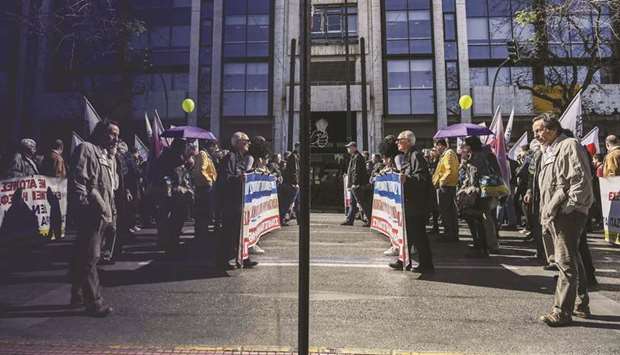Thousands protested in Greece yesterday against a new pension reform as a 24-hour strike paralysed transport and services.
Some 10,000 people demonstrated in the capital against the reform, which encourages a longer stay in the workforce, police said.
The labour action brought public transport in Athens as well as intercity trains and ferry ship services to a standstill.
Civil servants also walked off the job and journalists will stage a three-hour work stoppage against the pension reform.
With the subway, trains and public buses at a standstill, many commuters were forced to drive to work, leaving major traffic arteries into the sprawling city of almost 4mn blocked.
Passenger ships remained docked at ports.
“Everything is going downhill,” Thanassis Grigoropoulos, a municipal sanitation worker, told AFP. “The pensions will be at a lower level and we won’t be able to meet our obligations. That is the most important thing.”
Unions also staged protests in other major cities including Thessaloniki, where 2,500 people demonstrated according to police.
“This bill is practically the continuation of (austerity) laws introduced in 2010-2019,” civil servants’ union ADEDY said.
The new conservative government says the reform, to be voted by Friday, will make the troubled Greek pension system viable to 2070.
Conservative MP Christos Tarantilis called them “a decisive step in approaching other European countries’ best practices”.
But unions say they are a thinly-disguised attempt to privatise pension funds, and accuse politicians of reneging on a promise to rescind all bailout-mandated cuts.
The labour ministry says the overhaul – the third major revamp in a decade – will contain pension increases and reduce penalties for pensioners who opt to continue working after reaching retirement age.
Successive governments have attempted to reform the pension system, whose previously generous handouts are seen as one of the causes of Greece’s decade-long debt crisis.
“The government will pay dearly for the further dismantling of social insurance, as (its predecessors) did.
“The Greek people do not forget,” said Communist Party general secretary Dimitris Koutsoumbas.
A separate government bill to stiffen regulations on street protests is also causing anger among unions.
Chronic overspending and inaccurate reporting of the budget deficit spooked creditors in 2010, and three successive bailouts by the EU and the International Monetary Fund (IMF) were needed to avert a Greek bankruptcy.
In return for billions of euros in rescue funds, Greece had to adopt unpopular austerity reforms and pension cuts.
“It’s been chop job after chop job in the last (few) years. We are striking because we want pensions we can live on,” said Dimitris Volis, a steward at a coastal ferry company in Piraeus, the port that serves Athens.
“I’ve been working since I was 17 and they are telling me I won’t get a pension until 67. Will I endure this until then?” said Nectaria, 48, a single mother who works as a cleaner.
Others had little sympathy for the strikers.
“A strike has never accomplished anything,” said pensioner Dimitris Polychroniadis, angry that he had to pay for a taxi instead of taking public transport.

People taking part in a demonstration marking a 24-hours strike over a new pension overhaul are reflected in the facade of a building in Athens.
